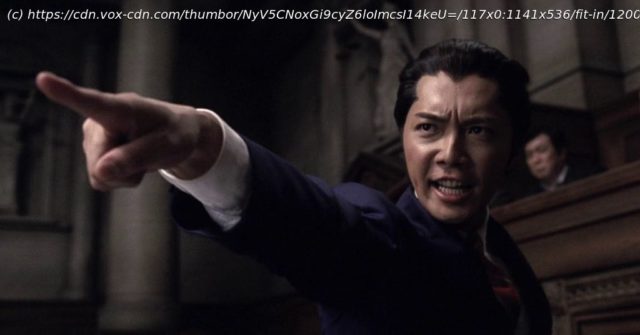The best video game adaptation of all time isn’t The Last of Us or The Super Mario Bros. Movie — it’s Ace Attorney, from Takashi Miike.
“Objection!”
The first time this is uttered early in Takashi Miike’s Ace Attorney feels like a shot of pure adrenaline for fans of the video game series on which the movie is based. Rookie defense attorney Phoenix Wright (Hiroki Narimiya), looking to gain an early foothold in what’s only his second-ever case, immediately goes on the offensive, convinced the evidence he’s about to present will expose a glaring, crucial contradiction in a piece of witness testimony.
It’s the sheer brio with which the phrase is delivered that makes it so exhilarating: the sudden upsurge in volume that jolts even Wright’s own client; the unapologetic extra-ness of the iconic finger point; the volcanic aggression with which Wright then slams his desk and hurls a holographic screen at the unsuspecting police detective on the witness stand.
It’s all so delightfully unnecessary, so wonderfully extraneous — so Phoenix Wright, if you will. And in being those things, it’s the ultimate statement of intent, announcing the movie’s willingness to launch itself headfirst into the unbridled theatrics of the video games. What makes the moment feel even truer to the source material is that we barely even have time to register this apparently triumphant peak before we’re plummeting deep into a valley. Wright goes from believing he’s struck a devastating blow to the prosecution’s case to being on the back foot and on the brink of crushing defeat in what feels like the space of a millisecond. Soon he’s crumpled helplessly over his desk, desperately scrambling for something — anything — that might somehow save him and his client.
That sense of emotional whiplash is exactly what fans of the Ace Attorney games would expect and demand from a movie adaptation — these are, after all, games all about impossible turnabouts, the violent swings in fortune that see you careening from euphoric highs to depressing lows, certain victory to certain defeat and back again, with the snap of a finger or the banging of a gavel. The movie oscillates at a relentless pace that might feel totally destabilizing to Ace Attorney newcomers, but feels warmly familiar to those who’ve ever set foot in the game’s courtroom, with its ever-escalating sense of urgency that comes with constantly being on the precipice of humiliation.
On a tonal level, Ace Attorney nails the brief, leaning into the anarchic entropy of the games rather than tempering it, unafraid of alienating entire demographics who might be put off by the stylistic excess or topsy-turvy narratives. Miike parades the chaos front and center: The world of his movie is, like the world of the games, one in which people pull megaphones out of thin air, pet parrots are put on the witness stand, ghosts of dead attorneys outshine their living counterparts, and everyone boasts a hairdo beamed from another galaxy. There’s a perfect balance here between the source material and the creative impulses of the director that very few adaptations manage to strike. Miike rises to meet the energy of the games, punctuating the movie’s aesthetic with sparkling stylistic flourishes: split screens, dolly zooms, and a hell sequence straight out of Nobuo Nakagawa’s Jigoku.
Start
United States
USA — software Why Takashi Miike’s Ace Attorney remains the perfect video game movie adaptation






